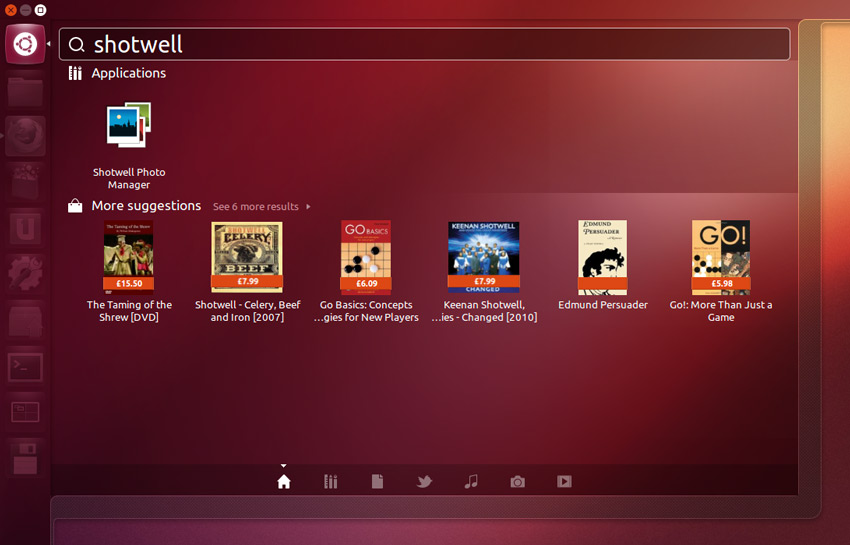Mark Shuttleworth, the founder of Ubuntu, has taken to his blog to add context to the latest controversial change in Ubuntu: shopping results.
Admittedly when it’s phrased like that it sounds surreal; how can shopping results be controversial? But last Friday a small section of the Ubuntu community threw their arms up in anger at, what they percieved to be, the encroachment of adware into Ubuntu.
Amazon product results, whilst undoubtedly useful, generate a small cut of revenue for Canonical and Ubuntu each time a purchase is made. So were they implemented solely to be self-serving? Or is their introduction a win-win; a way to give users a new feature and make money for Ubuntu at the same time?
“Perfect Sense”
Shuttleworth is clear:
“It makes perfect sense to integrate Amazon search results in the Dash because the Home Lens of the Dash should let you find *anything* anywhere.”
“Over time, we’ll make the Dash smarter and smarter, so you can just ask for whatever you want, and it will Just Work.”
That idea doesn’t sound half bad. You open the Dash, enter a term, and Ubuntu figures out what it is you want.
“You can narrow the scope of that search if you want. For example, you can hit Super-A and just search applications. But if you throw your query out to the Dash, we need to be a smart as possible about where we go looking for answers for you.”
This is, he says, why Ubuntu 12.10 includes Amazon shopping results. The Dash will take your search result (be it ‘Shotwell’ or “Dishwashers”) and find local and online results that match it – an attempt to ‘figure out what you want and give it to you’.
But these results, he says, are not, as some claim them to be, ads.
“They are results to your search. We don’t promote any product or service speculatively, these are not banners or spyware. These are results from underlying scopes, surfaced to the Home lens, because you didn’t narrow the scope to a specific, well scope.”
“…they are not paid placement, they are straightforward Amazon search results for your search. So the Dash becomes a super-search of any number of different kinds of data. Right now, it’s not dynamically choosing what to search, it’s just searching local scopes and Amazon, but it will get smarter over time.”
More to Come
And it’s that ‘over time’ that Mark is keen for people to realise.
“[This] isn’t the full experience,’ he says, ‘so those who leap to judgement are at maximum risk of having to eat their words later.’
So why Amazon? If anything has exposed this (potentially fantastic) new feature to accusations of being a solely self-serving one it’s the fact that it only queries one online retailer.
Shuttleworth explains the decision:
“We picked Amazon as a first place to start because most of our users are also regular users of Amazon, and it pays us to make your Amazon journey get off to a faster start. Typing Super “queen marking cage” Just Worked for me this morning. I am now looking forward to my game of Ultimate Where’s Waldo hunting down the queens in my bee colonies, Ubuntu will benefit from the fact that I chose to search Amazon that way, Amazon benefits from being more accessible to a very discerning, time-conscious and hotkey-friendly audience.
But there are many more kinds of things you can search through with Unity scopes. Most of them won’t pay Ubuntu a cent, but we’ll still integrate them into the coolest just-ask-and-you’ll-receive experience. I want us to do this because I think we can make the desktop better.”
From this was can infer that, at some point, more result sources will be added, querying a variety of different places. Local businesses? Directions? The Yellow Pages? All would make plausible additions to the “brain” backend.
Is the Dash on course to become Ubuntu’s Siri and Google Now?
‘Kinks to be Unkinked’
His suggestions for those who don’t like the new feature is to ‘stick with 12.04 LTS’ for the time being, remove the lens, or just knuckle on down and use it now knowing that by 14.04 LTS should see the ‘kinks unkinked’.
“We can’t wait till it’s perfect before landing everything,” he argues, “because the only way to learn what’s not perfect is to have other people – real people – use it.”
Finally, on the question of privacy, he writes:
“We are not telling Amazon what you are searching for. Your anonymity is preserved because we handle the query on your behalf. Don’t trust us? Erm, we have root. You do trust us with your data already.”
Convinced?
Are you convinced that Amazon product results is a good idea?

